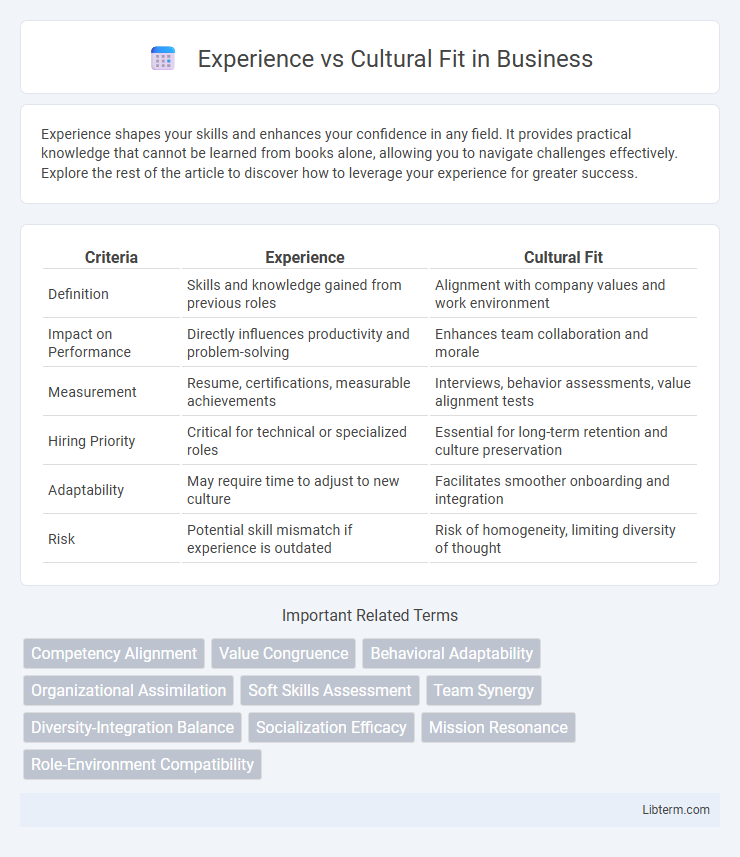Experience shapes your skills and enhances your confidence in any field. It provides practical knowledge that cannot be learned from books alone, allowing you to navigate challenges effectively. Explore the rest of the article to discover how to leverage your experience for greater success.
Table of Comparison
| Criteria | Experience | Cultural Fit |
|---|---|---|
| Definition | Skills and knowledge gained from previous roles | Alignment with company values and work environment |
| Impact on Performance | Directly influences productivity and problem-solving | Enhances team collaboration and morale |
| Measurement | Resume, certifications, measurable achievements | Interviews, behavior assessments, value alignment tests |
| Hiring Priority | Critical for technical or specialized roles | Essential for long-term retention and culture preservation |
| Adaptability | May require time to adjust to new culture | Facilitates smoother onboarding and integration |
| Risk | Potential skill mismatch if experience is outdated | Risk of homogeneity, limiting diversity of thought |
Defining Experience in the Workplace
Experience in the workplace encompasses the skills, knowledge, and practical exposure gained through previous roles, projects, and industry-specific tasks. It includes measurable achievements, technical competencies, and the ability to navigate complex work environments effectively. Defining experience involves assessing both the duration and relevance of past work, ensuring candidates possess the necessary expertise to meet job requirements.
What Is Cultural Fit?
Cultural fit refers to how well a candidate's values, beliefs, and behaviors align with the core values and workplace environment of an organization. It plays a crucial role in employee satisfaction, collaboration, and long-term retention, often impacting team dynamics more than technical skills alone. Employers assess cultural fit through behavioral interviews, value-based questions, and observations during the hiring process to ensure candidates will thrive within their unique corporate culture.
The Importance of Experience in Hiring Decisions
Experience plays a critical role in hiring decisions by providing candidates with proven skills and industry knowledge that directly contribute to job performance and productivity. Employers prioritize experienced professionals who can navigate complex challenges, reduce training time, and deliver immediate value to the organization. While cultural fit is important for team cohesion, experience ensures that the candidate possesses the technical competence and practical insights needed to drive business success.
The Role of Cultural Fit in Organizational Success
Cultural fit plays a crucial role in organizational success by enhancing employee engagement, collaboration, and retention, which ultimately boosts productivity. Companies that prioritize cultural alignment during hiring processes often experience lower turnover rates and stronger team cohesion. While experience ensures technical competence, cultural fit drives the sustainable integration of employees into a company's mission and values, fostering long-term growth.
Experience vs Cultural Fit: Key Differences
Experience emphasizes proven skills, technical expertise, and past job performance, while cultural fit focuses on alignment with a company's values, work environment, and team dynamics. Experience can be quantified through degrees, certifications, and measurable achievements, whereas cultural fit is assessed through personality traits, communication style, and adaptability. Employers balance experience and cultural fit to ensure both competence and cohesive workplace integration.
Balancing Skills and Company Values
Balancing experience and cultural fit involves evaluating a candidate's technical skills alongside their alignment with company values and work environment. Prioritizing both ensures effective job performance and long-term engagement, as expertise drives productivity while cultural fit fosters collaboration and commitment. Organizations that integrate skill assessments with value-based interviews achieve stronger team cohesion and reduced turnover.
Common Pitfalls in Prioritizing One Over the Other
Emphasizing experience over cultural fit often leads to hiring technically skilled individuals who may struggle with team dynamics, causing reduced collaboration and morale. Prioritizing cultural fit alone risks creating homogenous teams, limiting diversity of thought and innovative problem-solving. Balanced evaluation of both factors helps build competent, cohesive teams that drive sustained organizational success.
Assessing Experience Effectively
Assessing experience effectively involves evaluating candidates' demonstrated skills and past achievements through detailed project reviews, technical tests, and behavioral interviews. Quantifiable metrics such as years of relevant experience, certifications, and specific accomplishments provide measurable indicators of proficiency. Focusing on practical expertise ensures hiring decisions are grounded in candidates' proven capabilities rather than subjective cultural perceptions.
Evaluating Cultural Fit During Recruitment
Evaluating cultural fit during recruitment involves assessing candidates' alignment with a company's core values, mission, and work environment to ensure long-term engagement and productivity. Structured behavioral interviews, culture assessment tools, and scenario-based questions help reveal candidates' interpersonal skills, adaptability, and teamwork compatibility. Prioritizing cultural fit alongside experience reduces turnover rates and fosters a cohesive workplace culture that drives organizational success.
Striking the Right Balance: Best Practices
Striking the right balance between experience and cultural fit involves assessing candidates through behavioral interviews and skill-based tests to ensure they meet job requirements while aligning with company values. Implementing structured interview frameworks and leveraging data-driven evaluations minimizes bias and promotes objective decision-making. Organizations that prioritize both technical proficiency and cultural alignment see increased employee retention and overall team performance.
Experience Infographic

 libterm.com
libterm.com